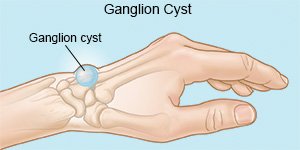Ganglion Cyst Removal
Medically reviewed by Drugs.com. Last updated on Sep 23, 2025.
What do I need to know about ganglion cyst removal?
Ganglion cyst removal is surgery to remove a small fluid-filled sac that usually occurs in the hand, wrist, foot, or ankle.
 |
How do I prepare for ganglion cyst removal?
- Your surgeon will talk to you about how to prepare for surgery. Your surgeon may tell you not to eat or drink anything after midnight on the day of your removal. Arrange for someone to drive you home after surgery.
- Tell your surgeon about all medicines you currently take. Your surgeon will tell you if you need to stop any medicine for surgery, and when to stop. Your surgeon will tell you which medicines to take or not take on the day of your surgery. Tell your surgeon if you had an allergic reaction to any medicine or anesthesia.
- You may need tests such as an x-ray, ultrasound, or MRI to check the size and location of the ganglion cyst. Your surgeon will tell you when to get these tests. Contrast liquid may be used to help the cyst show up better in the pictures. Tell the healthcare provider if you had an allergic reaction to contrast liquid. Do not enter the MRI room with anything metal. Metal can cause serious injury. Tell the provider if you have any metal in or on your body.
What will happen during ganglion cyst removal?
- You may be given local anesthesia to numb the surgery area. With local anesthesia, you may still feel pressure or pushing during surgery, but you should not feel pain.
- Your surgeon will make 1 or more incisions near the cyst. The surgeon will use small tools to remove the cyst. An endoscope (scope with a camera) may be used to help your surgeon see the cyst.
- Your incision may be closed with stitches, or medical glue. Your incision will be covered with a bandage.
What should I expect after ganglion cyst removal?
You will be taken to a room to rest until you are fully awake. Healthcare providers will monitor you closely for any problems. Do not get out of bed until your healthcare provider says it is okay.
What are the risks of ganglion cyst removal?
Your ganglion cyst may come back after treatment. Your scar could be painful. You may bleed too much or get an infection. You may have damage to your nerves or tendons that could lead to numbness or weakness.
Care Agreement
You have the right to help plan your care. Learn about your health condition and how it may be treated. Discuss treatment options with your healthcare providers to decide what care you want to receive. You always have the right to refuse treatment. The above information is an educational aid only. It is not intended as medical advice for individual conditions or treatments. Talk to your doctor, nurse or pharmacist before following any medical regimen to see if it is safe and effective for you.© Copyright Merative 2025 Information is for End User's use only and may not be sold, redistributed or otherwise used for commercial purposes.
Further information
Always consult your healthcare provider to ensure the information displayed on this page applies to your personal circumstances.
